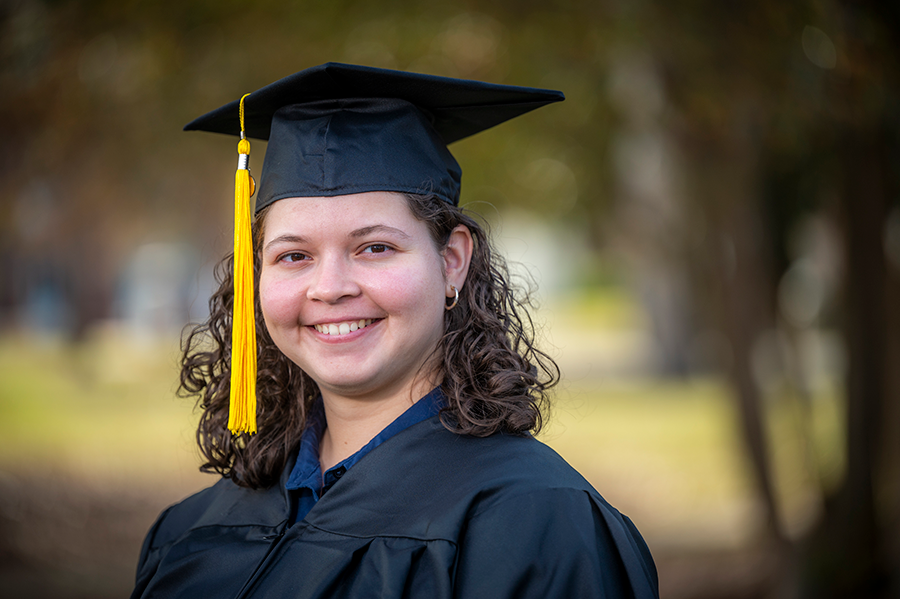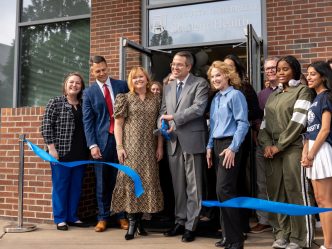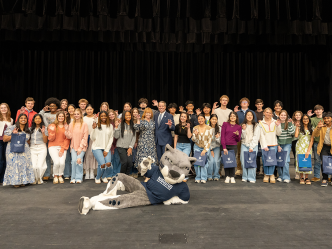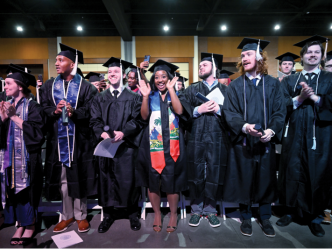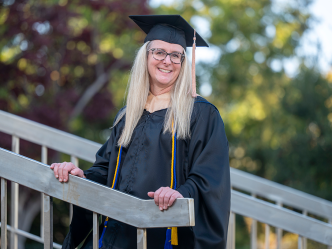On-campus organizations have been proven to enhance a student’s college experience.
Aside from the obvious positives of being around like-minded individuals, offering a safe environment of belonging and helping to improve communication and social skills, being involved with on-campus, student-run organizations can also help students better understand the material being taught in their courses.
For Briana Campbell, a cybersecurity major graduating from Augusta University’s School of Computer and Cyber Sciences, her experience at AU has been about strategically surrounding herself with people who can help her succeed by approaching each organization and class as a pool of knowledge and less a competition.
Getting involved
The Fayetteville, Georgia, native is active in five student organizations, including Girls Who Code, Women in Cybersecurity, Cybertronics Makers Club, AU’s chapter of the Association for Computing Machinery (ACM Cyber) and Upsilon Pi Epsilon. Campbell is also a part of the VICEROY and CyberCorps Scholarship for Service programs.
She credits being active in each group and the community of people she has surrounded herself with from AU for helping her succeed in a difficult field, including gaining more hands-on experiences that she didn’t feel she would have necessarily gotten in the classroom, certainly not at a larger school.
“I have really enjoyed interacting with the community of people I have met here at Augusta University because you can’t do it alone. Cybersecurity isn’t a one-person job. It takes a team to make sure everything is secure,” Campbell said. “One person keeping all the knowledge doesn’t help anyone, and I like to view it as a pool of knowledge and not as a competition. If I can learn something and I see someone else struggling, if we share that knowledge with each other, we are all better off for it, and we can help the cybersecurity landscape.”
For Campbell, who came to AU already with two associate degrees in web design and web development from Southern Crescent Technical College in Griffin, Georgia, the community she has surrounded herself with in SCCS is helping to change the look and landscape of computer science and cybersecurity.
Both fields are still heavily male dominated, but two groups in particular, Girls Who Code and Women in Cybersecurity, are helping young women interested in these fields develop a network of support around each other.
“Being a woman in cyber has given me a sense of purpose. I want other women and girls to see that this is something that is possible for us to do.”
Briana Campbell, cybersecurity major graduating from Augusta University’s School of Computer and Cyber Sciences
“Girls Who Code and Women in Cyber are two amazing clubs that have helped us build a community of women who support each other. It’s been really inspiring to see all of these women come together, wanting to help each other and motivate each other for the opportunities that we can get,” Campbell said.
One of the positive aspects of being strategic in which organizations she joined is that each offers her an opportunity to have more experience either learning her course material or getting to learn a new aspect she had not explored before, as is the case with Cybertronics Makers Club.
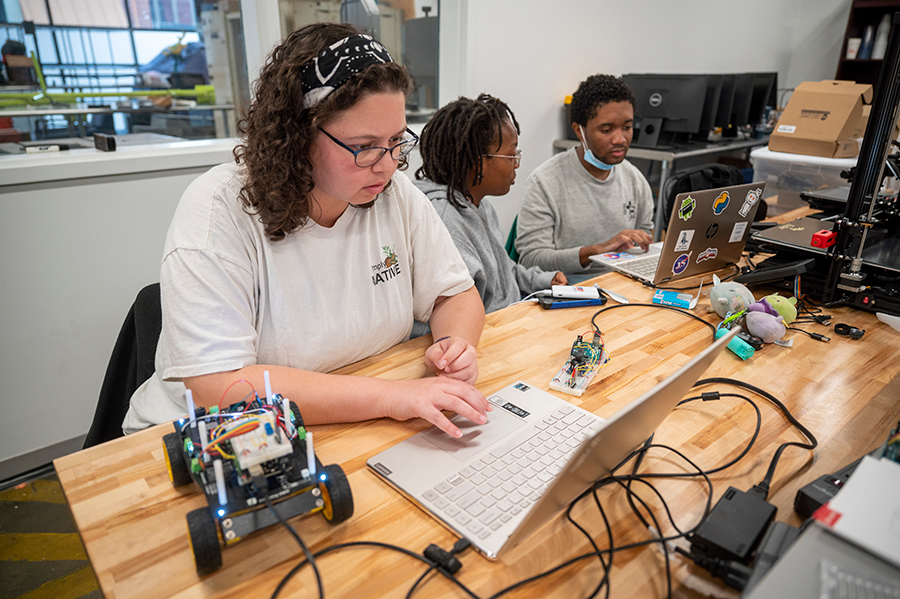
“It’s been interesting. I was going through classes, getting a basic understanding of what cybersecurity is, but I had the opportunity to join several clubs, and through those clubs I got more hands-on experience and a greater understanding for what cybersecurity really is,” she said. “With Cybertronics Makers Club, we get to handle microcontrollers we don’t normally use, so I have gotten that hands-on experience for hardware that I haven’t really had in the classroom.”
A supportive community
On top of being active in her five groups, she also credits the relationships she has developed with her classmates and instructors.
As soon as she arrived on campus, Campbell immediately connected with fellow SCCS student Wesley Cooke. While Cooke ultimately changed majors to move in a different career direction, his friendship and understanding of the topics they were studying helped Campbell early on.
“Wesley was one of the first people I met when I came here. We were in a 1301 programming class together covering C Sharp (C#). I struggled with that class because I wasn’t used to that language yet, but he took time to meet with me and help me understand what was going on,” Campbell recalled. “Now, he is the vice president of the Cybertronics Makers Club, and he’s helping more students with their projects.”
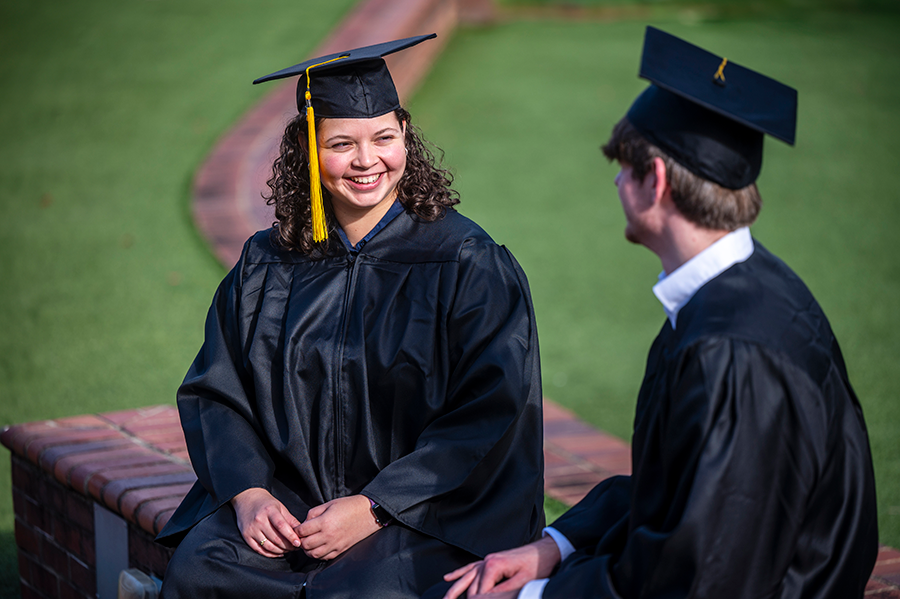
Not only have her classmates helped Campbell feel more comfortable with the material, but she also credits the close relationships she has developed with her instructors and professors. One such relationship is unique in that adjunct professor Cory Singleton, DCS, was also in a couple of courses with Campbell for AU’s Cyber Defender certificate. Campbell credits Singleton for taking the extra time to show an interest in his students’ studies and preparing them for what is to come after graduation.
“Dr. Singleton teaches networking and cybersecurity, and he is our coach for ACM Cyber. He has really changed my perspective because he gives us a lot of tips and methods, both in our competitions and just how to look at the field in general. He has helped us with our résumés and has shown us different methodologies that we can see what best fits us, our backgrounds and our goals.”
Singleton, who coaches the ACM Cyber team in the National Cyber League, is honored to be able to share his knowledge with the next generation of cyber defenders, and he sees great potential in Campbell, who hopes to begin her master’s program in the spring.
“Briana is a phenomenal student as she is not only an academic but also a leader among her peers. She has been a key member of the ACM Cyber club as she directly aided me in leading students in the NCL, the Collegiate Penetration Testing Competition and various other capture the flag events,” Singleton said.
“I have witnessed Briana lead multiple efforts in Girls Who Code, ACM Cyber, and establish new partnerships with potential employers to impact the student body. This servant-leadership style is an admirable trait that sets Briana apart from others. Briana makes every effort to improve everything around her, which will make her an invaluable asset continuing on into her graduate program, as well as for anyone lucky enough to employ her. I cannot wait to see what she will accomplish next.”
Unique opportunities
Outside the student-run organizations she is a part of, Campbell recognizes she has been afforded numerous unique opportunities to gain a different perspective on the field through VICEROY and CyberCorps Scholarship for Service, including an internship over the summer with the U.S. Air Force Research Laboratory in Rome, New York.
“I have really loved VICEROY because I was able to get a summer internship with the Air Force Research lab, and that was a chance many students don’t get. With that, I got to see how professionals in the field work through their problems,” Campbell said. “We were given our own problem that we wrote a research paper about. We really got to explore that and see how that would affect the Air Force overall with the challenge to make the Air Force more secure. VICEROY is also providing me a path toward getting my security plus certification.”
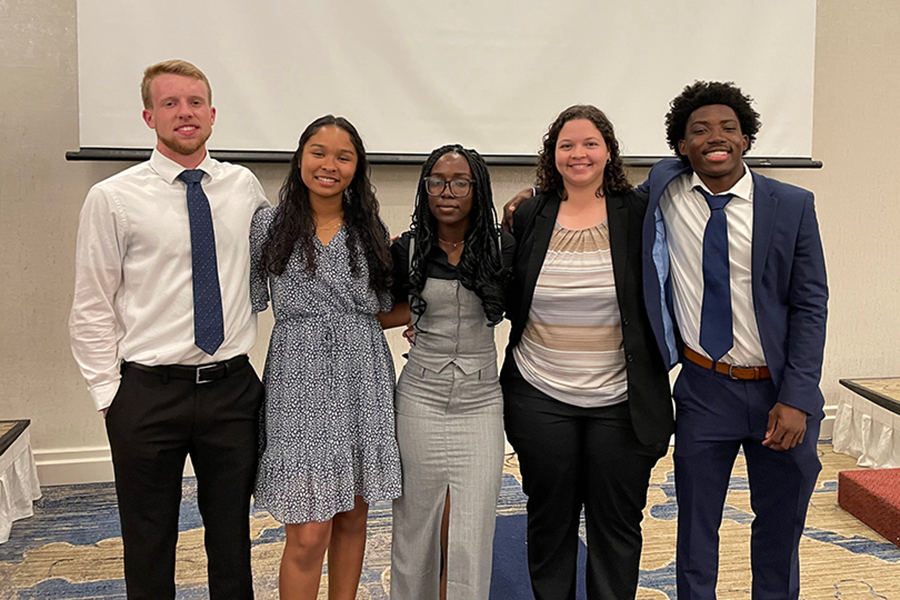
Other experiential learning opportunities have included multiple trips to Fort Eisenhower, formerly Fort Gordon, as well as tours of and presentations by the different groups housed within the Georgia Cyber Innovation and Training Center. Campbell mentioned the Georgia Cyber Center, home to numerous government agencies and other companies and groups from the private sector, as a major reason for choosing AU.
“One of the big reasons for me to come to AU was the Cyber Center,” Campbell said. “Being able to have classes on the second floor knowing GBI and other industry partners are in the building, that is really cool. Plus, SEIGE CyberOps is in the other building, and Fort Eisenhower is here in town, so I knew there were lots of connections for me to make that will help me during my career.”
Setting an example
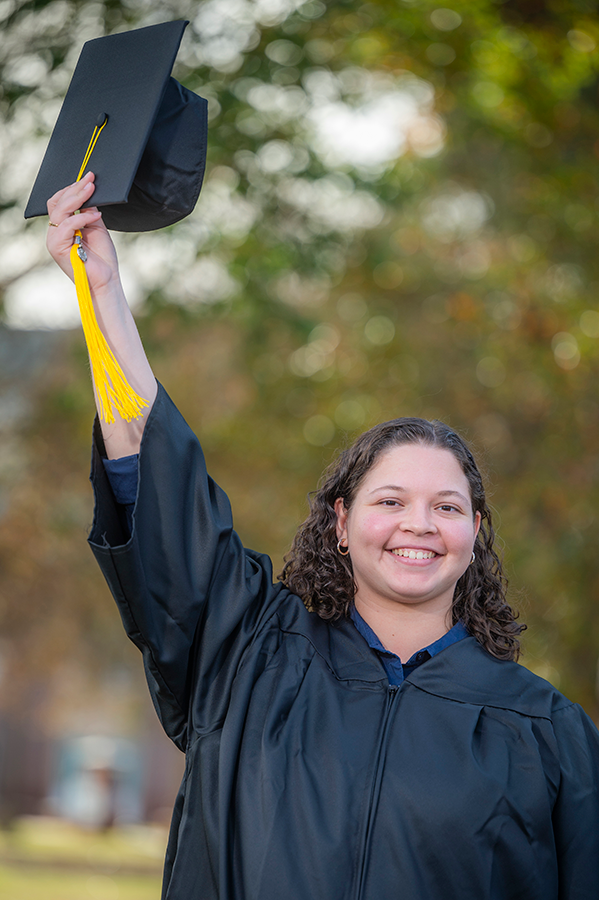
Now, Campbell is ready to take what she has learned through her undergraduate experience and apply it to graduate school, but not before realizing what she represents to those following in her footsteps, even if she didn’t set out to be that.
“I had a fellow student who told me that she came to AU because when she was in high school, she saw social media posts that I was in and she said to me that really encouraged her to pursue a degree in cybersecurity because it allowed her to see a fellow woman doing it and succeeding,” Campbell said. “Being a woman in cyber has given me a sense of purpose. I want other women and girls to see that this is something that is possible for us to do.”
 Augusta University
Augusta University
